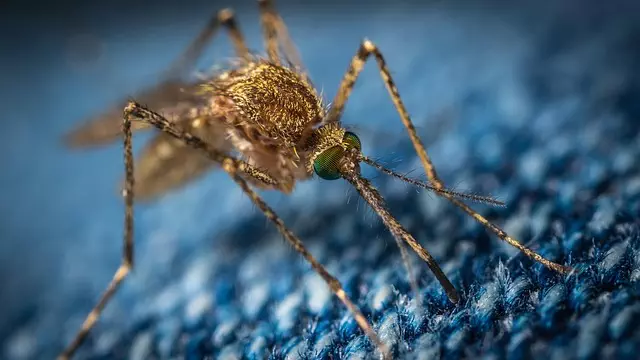Mosquitoes pose significant health risks by spreading diseases like malaria, dengue fever, and Zika virus, highlighting the importance of effective mosquito control. Traditional chemical pesticides have environmental and health drawbacks, prompting a shift towards eco-friendly alternatives like biological control agents and habitat manipulation. Targeted treatments, community efforts, and collaborative initiatives are key to successful mosquito control. Emerging technologies, citizen participation, and integrated pest management (IPM) methods enhance safety and sustainability. Adopting these strategies is crucial for mitigating mosquito-borne diseases while preserving ecosystems and public health.
“Mosquitoes pose a significant health hazard, transmitting diseases like malaria, dengue, and Zika. This article delves into comprehensive mosquito control strategies, balancing effectiveness with environmental safety. We explore traditional methods, from insecticides to biological controls, and highlight environmentally friendly alternatives. Targeted treatments, preventive measures for homes, community-wide management, and emerging technologies offer effective solutions. Long-term strategies emphasize sustainable practices, citizen participation, and awareness for a holistic approach to mosquito control.”
Understanding Mosquito-Related Hazards

Mosquitoes pose a significant health risk, acting as vectors for various diseases, including malaria, dengue fever, and Zika virus. Understanding these hazards is crucial in implementing effective mosquito control measures. These insects breed rapidly, especially in stagnant water, which makes them hard to eradicate once established.
Knowledge of their behavior and life cycle enables communities to take proactive steps. This includes eliminating breeding sites, such as empty containers and clogged gutters, using insecticides strategically, and adopting personal protective measures like wearing long-sleeved clothing and using mosquito repellents. By combining these strategies, individuals and communities can significantly reduce the risk of mosquito-borne diseases, enhancing public health and safety.
Traditional Mosquito Control Methods

Traditional mosquito control methods often rely on chemical pesticides, which can be effective but also come with environmental and health concerns. These chemicals, such as organophosphates and pyrethroids, are designed to kill adult mosquitoes by interfering with their nervous systems. While they may reduce mosquito populations, they can also harm beneficial insects like bees and butterflies, contaminate water sources, and persist in the environment, leading to long-term ecological imbalances.
Moreover, resistance to these chemicals is on the rise, making them less effective over time. Alternative methods, such as biological control agents, habitat manipulation, and vector monitoring, offer more sustainable solutions for mosquito control. By introducing natural predators like fish or bacteria that target mosquito larvae, or modifying breeding sites to reduce their availability, these approaches aim to manage mosquito populations without relying heavily on synthetic pesticides.
Environmentally Friendly Alternatives

In the realm of mosquito control, it’s essential to consider environmentally friendly alternatives that mitigate the impact on local ecosystems. Many conventional methods rely on chemical pesticides, which can have detrimental effects on non-target species and contribute to water pollution. As a result, there’s a growing emphasis on eco-friendly solutions like biological control agents, such as bacteria, viruses, and parasitic wasps that target specific mosquito species without harming beneficial insects.
These natural methods offer a sustainable approach to mosquito control, fostering a harmonious balance in the environment. For instance, introducing predator insects like dragonflies or using plant-based repellents can significantly reduce mosquito populations. By adopting these environmentally conscious alternatives, communities can effectively manage mosquito-borne diseases while preserving biodiversity and maintaining a healthier ecosystem.
Targeted and Selective Treatments

When it comes to mosquito control, targeted and selective treatments are the way to go. Unlike widespread spraying, which can be harmful to both human health and the environment, these methods focus on specific areas where mosquitoes breed and rest. By understanding their behavior, we can apply treatments precisely where they’re needed most, such as around standing water and in lush vegetation.
Selective mosquito control involves using a mix of strategies including biological controls like introducing natural predators, larvicides to target immature mosquitoes, and adulticides for mature insects. This approach ensures that the methods used are not only effective against mosquitoes but also minimize potential harm to other insects, birds, and wildlife in the area, making it a safer and more sustainable option for Mosquito Control.
Preventive Measures in Residential Areas

In residential areas, mosquito control begins with a multi-faceted approach focusing on preventive measures. Homeowners can significantly reduce mosquito populations by eliminating standing water around their properties, as mosquitoes breed in stagnant water. Regularly emptying water from flower pots, birdbaths, buckets, and other containers is crucial. Maintaining mowed lawns and trimming vegetation reduces habitat accessibility for mosquitoes. Additionally, installing window screens and door nets helps keep these pests out of homes.
Beyond individual efforts, community collaboration is vital. Local governments and homeowner associations can implement broader strategies such as treating water bodies with biological agents that target mosquito larvae or installing bat houses to encourage natural predators. These collective actions not only enhance mosquito control but also foster a healthier, more enjoyable living environment for residents.
Community-Wide Mosquito Management

In effective mosquito control, community-wide management is a comprehensive strategy that involves collective efforts across an entire region to minimize mosquito populations and their associated risks. This approach goes beyond individual properties and focuses on creating an overall healthier environment by targeting breeding grounds, reducing standing water, and implementing integrated pest management techniques. By collaborating, communities can achieve sustainable mosquito control, ensuring the safety and well-being of all residents.
Community participation is a key aspect, where citizens are educated about mosquito life cycles and encouraged to take proactive measures. This includes proper waste disposal, maintaining clean outdoor spaces, and using appropriate insecticides. Such collaborative initiatives not only reduce mosquito habitats but also foster a sense of shared responsibility, ultimately enhancing the effectiveness of mosquito control efforts.
Emerging Technologies in Mosquito Control

The realm of mosquito control is witnessing a metamorphosis with the advent of innovative technologies, offering safer and more effective solutions to combat these persistent pests. Among the emerging game changers are advanced genetic techniques that enable the development of genetically modified mosquitoes, which can help control populations by disrupting their breeding cycles. These engineered insects have shown promise in reducing mosquito-borne disease transmission in specific areas.
Additionally, modern digital tools and data analytics play a pivotal role. Smart sensors and drones equipped with cameras can monitor mosquito habitats and detect early signs of breeding sites, allowing for precise and timely intervention. This technology, combined with geographic information systems (GIS), enables targeted application of control measures, reducing the need for widespread chemical usage. Such tailored approaches enhance both efficiency and safety in mosquito control efforts.
Citizen Participation and Awareness

Citizen participation plays a crucial role in effective mosquito control. Individuals can contribute significantly by staying informed about local mosquito activity and potential breeding sites. Encouraging folks to inspect their properties for standing water—a prime breeding ground for mosquitoes—is key. Simple actions like removing stagnant water from buckets, flower pots, or old tires can make a substantial difference. Community-led initiatives, such as neighborhood clean-up drives, further enhance efforts by eliminating mosquito breeding habitats.
Awareness campaigns are instrumental in fostering citizen engagement. Educating communities about the lifecycle of mosquitoes and the diseases they transmit empowers individuals to take proactive measures. By understanding the importance of early detection and reporting mosquito-related issues to local health authorities, citizens become valuable allies in the fight against mosquito-borne illnesses. This collaborative approach ultimately strengthens the overall mosquito control strategy.
Long-Term Strategies for Sustainable Mosquito Control

Long-term strategies for sustainable mosquito control focus on integrated pest management (IPM) approaches that prioritize environmental safety and community health. These methods go beyond quick fixes and aim to disrupt the mosquito lifecycle, reduce breeding grounds, and minimize the use of chemical pesticides. One effective strategy is implementing habitat manipulation techniques, such as draining standing water from containers like buckets, tires, or bird baths, which are ideal breeding sites for mosquitoes. Regularly trimming vegetation and maintaining landscaping can also make areas less attractive to these pests.
Additionally, introducing natural predators like certain fish species into aquatic habitats can help control mosquito populations. Biological controls, including the release of parasitic wasps that lay their eggs on mosquito larvae, further disrupt their lifecycle. Long-term planning also involves community education and participation. Encouraging residents to adopt simple practices, like using mosquito nets or wearing protective clothing outdoors, significantly reduces exposure to these insects. Community-wide awareness campaigns can foster a collective effort to maintain cleaner environments, ultimately leading to more sustainable mosquito control.
